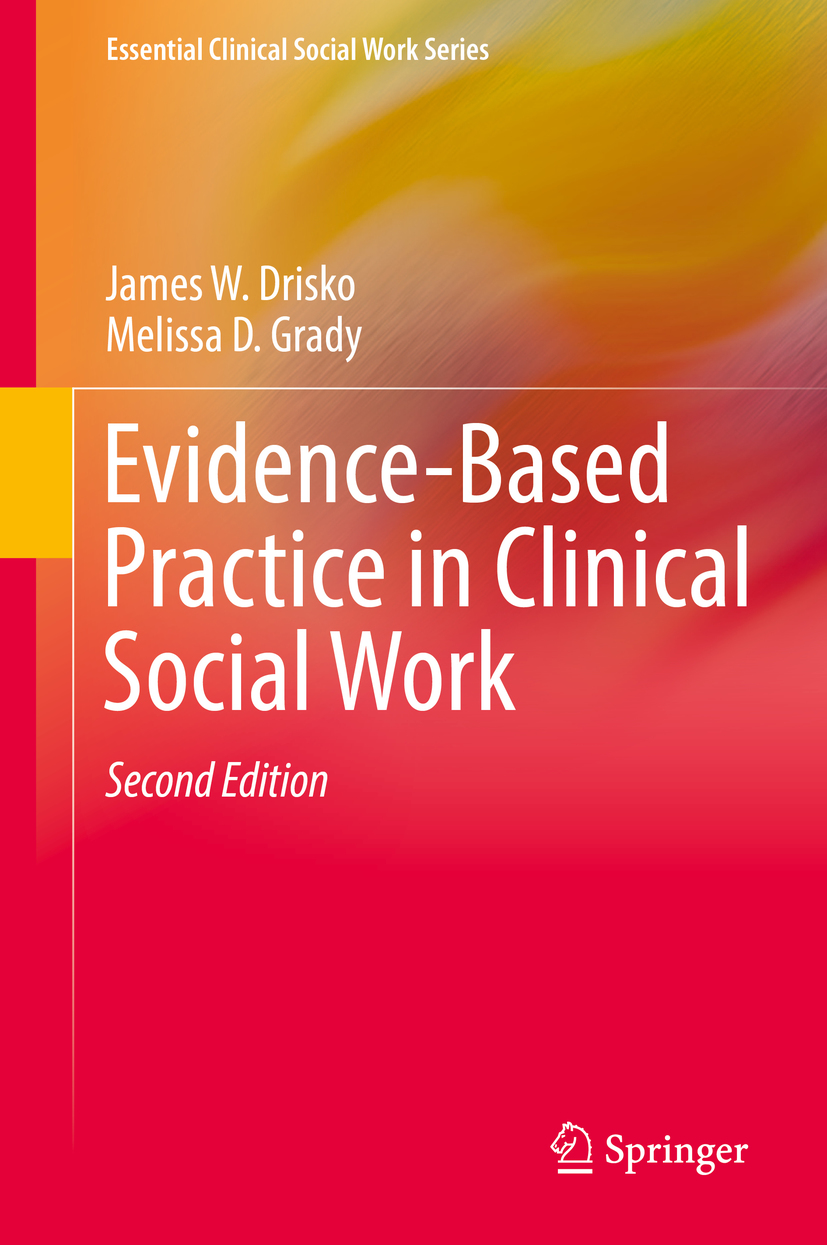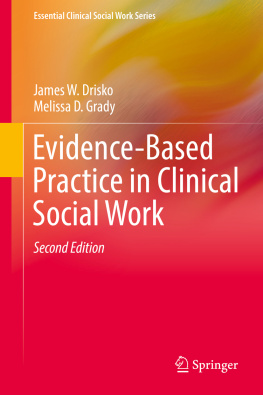James W. Drisko - Evidence-Based Practice in Clinical Social Work
Here you can read online James W. Drisko - Evidence-Based Practice in Clinical Social Work full text of the book (entire story) in english for free. Download pdf and epub, get meaning, cover and reviews about this ebook. City: Cham, year: 2019, publisher: Springer International Publishing, genre: Politics. Description of the work, (preface) as well as reviews are available. Best literature library LitArk.com created for fans of good reading and offers a wide selection of genres:
Romance novel
Science fiction
Adventure
Detective
Science
History
Home and family
Prose
Art
Politics
Computer
Non-fiction
Religion
Business
Children
Humor
Choose a favorite category and find really read worthwhile books. Enjoy immersion in the world of imagination, feel the emotions of the characters or learn something new for yourself, make an fascinating discovery.
- Book:Evidence-Based Practice in Clinical Social Work
- Author:
- Publisher:Springer International Publishing
- Genre:
- Year:2019
- City:Cham
- Rating:4 / 5
- Favourites:Add to favourites
- Your mark:
- 80
- 1
- 2
- 3
- 4
- 5
Evidence-Based Practice in Clinical Social Work: summary, description and annotation
We offer to read an annotation, description, summary or preface (depends on what the author of the book "Evidence-Based Practice in Clinical Social Work" wrote himself). If you haven't found the necessary information about the book — write in the comments, we will try to find it.
Evidence-Based Practice in Clinical Social Work — read online for free the complete book (whole text) full work
Below is the text of the book, divided by pages. System saving the place of the last page read, allows you to conveniently read the book "Evidence-Based Practice in Clinical Social Work" online for free, without having to search again every time where you left off. Put a bookmark, and you can go to the page where you finished reading at any time.
Font size:
Interval:
Bookmark:

More information about this series at http://www.springer.com/series/8115

This Springer imprint is published by the registered company Springer Nature Switzerland AG.
The registered company address is: Gewerbestrasse 11, 6330 Cham, Switzerland
Evidence-based practice (EBP) is a major shaping influence in clinical social work practice, in relation to economic policies, and in professional education. The definition of EBP remains contested; professionals still fail to distinguish EBP as a practice decision-making process from a list of treatments that have some type of research support (which are correctly called empirically supported treatments). All mental health practitioners should understand what EBP is, what it is not, and how it shapes both client options and their own practice experiences. This book explores EBP in depth and in detail. Our focus includes case exemplars that show how the EBP decision-making process is done in practice.
There are many recent books about evidence-based practice in social work and in other mental health professions. In reviewing these books, it appeared to us that most of the books on EBP have been written by researchers, bringing a particular point of view and expertise to the technicalities of EBP. These books are important to social workers and other mental health professionals because EBP involves a lot of technical details about research design, methods, and interpretation that are not always covered in other social work texts. On the other hand, the lack of a more direct practice and clinical viewpoint seemed to leave out a lot of the day-to-day realities clinical social workers confront in learning and using EBP in practice. Recent books also lacked much in the way of a broad and critical perspective on EBP as a social movement shaping policy, agency practice, and views of what constitutes good research. As we explored other books as resources for our students and for our own practice, we missed both a larger or meta-perspective on EBP and a lack of attention to doing it in clinical practice. This book seeks to illustrate through several cases how important clinical knowledge and expertise are in doing EBP well. We seek to introduce the core ideas and practice of EBP and then illustrate them by applying the concepts and processes to real-world cases. We also take a critical look at how EBP has been implemented in practice, education, and policy.
Eight years after we wrote the first edition of this book, EBP continues to be a major influence on clinical practice. Some areas of the book, particularly the research evidence used in our case examples, needed to be updated and made current. This we did carefully. We also added new case examples based on trauma and on opioid dependence as frequent contemporary concerns leading to undertaking clinical services. The core ideas of EBP appear unchanged, but the evidence it rests upon has evolved. Yet, the definition and uses of EBP remain unclear to many and are used by educators and researchers in ways that undermine clarity about what EBP is in practice. Further, the limited inclusion of populations of color, of LGBTQ+ persons, and of co-occurring disorders sadly limit the relevance of research results for many of todays clients. EBP has many merits but also some serious limitations. One key and continuing limitation is the lack of extensive high-quality research results on many client concerns and for many types of treatments.
We, the authors, are both clinical social workers with practice experience in a variety of settings and academic researchers. We have worked in community mental health, public schools, psychiatric inpatient and outpatient services, as well as private practice. Day-to-day practice challenges are very familiar to us both. Each of us has done quantitative and qualitative research on many aspects of practice theory, practice process, and practice outcomes. In addition, we are also teachers of clinical social work practice. We are committed to social works core values and to the many merits of the person-in-situation perspective that distinguishes social work from related professions. While we think that EBP represents a useful approach to improving outcomes in clinical social work practice, we also think it is a complex social movement as well as a practice decision-making process. As social workers, we take a broad view of social phenomena and believe that EBP is best understood from several perspectives.
This book is intended for clinical social workers and other mental health professionals in practice. It will also be suitable for advanced level masters students and doctoral students. Many introductory level books on EBP emphasize procedures without much perspective or much detail. We seek to offer greater perspective, depth, and detail. This includes detailed examination of content from Cochrane Collaboration systematic reviews of practice research. Furthermore, we view many of the technical chapters of the book as reviews of research content, not initial introductions to the content. That said, we have tried to make the technical chapters clear but with enough detail for them to be useful to clinical social workers doing practice.
In our terminology and our examples of EBP, we have focused on the identification of treatment alternatives. We understandand addresshow EBP may be more broadly applied to the study of alternative diagnostic procedures, prognoses, prevention, prevalence, and economic analyses. We chose to focus our examples more narrowly to fit the interests of our intended audience of clinical social workers. We also have tried to locate our exploration of EBP in the context of social work professional values. Moreover, we think that the person-in-environment perspective can make a major, useful, contribution to EBP conceptualization and also believe it has implications for EBP methods.
Font size:
Interval:
Bookmark:
Similar books «Evidence-Based Practice in Clinical Social Work»
Look at similar books to Evidence-Based Practice in Clinical Social Work. We have selected literature similar in name and meaning in the hope of providing readers with more options to find new, interesting, not yet read works.
Discussion, reviews of the book Evidence-Based Practice in Clinical Social Work and just readers' own opinions. Leave your comments, write what you think about the work, its meaning or the main characters. Specify what exactly you liked and what you didn't like, and why you think so.











